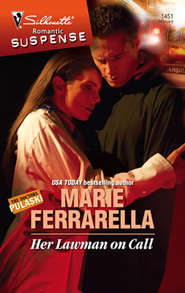По всем вопросам обращайтесь на: info@litportal.ru
(©) 2003-2024.
✖
The M.D. Meets His Match
Автор
Год написания книги
2018
Настройки чтения
Размер шрифта
Высота строк
Поля
April glanced at the next envelope and deposited it where it belonged. Her soul certainly belonged to something bigger than a town comprised of two rows of buildings that faced each other like participants in an old-fashioned square dance.
When she’d left, she’d been positive that nothing would ever bring her back here, here amid the snow and the scenery that went on forever without so much as a soul to disturb it, the loneliness so thick you couldn’t cut through it. But of course, her family was here—Gran and Max and June—so there’d been short visits throughout the years. And then she’d received the letter from June saying that Gran, their tiny but invincible tower of strength who had never been ill a day in her life, was sick. Angina, the doctor, Shayne Kerrigan, had said. So she had come back.
It was as simple as that. She owed Gran everything. She and Max and June, they all did. Everything. If Gran hadn’t taken them in when their mother had left them in every way but physically, becoming a vacant, broken shell of a woman, April wasn’t sure what she would have done. As the oldest by eleven months, she would have had to do something and she had tried. Tried to care for her brother and sister and her mother. But eleven had been a very young age to suddenly become an adult and she hadn’t been quite able to manage it.
Until then, she had believed herself up to the challenge. She’d felt she’d grown up rather quickly even before her father had walked out on them and their mother had gone to pieces. Living in a rural town in Alaska was no picnic, no matter what the travel brochures said to the contrary about the frozen state. Alaska, she thought, tossing a fashion magazine onto Edith Plunkett’s stack of mail, was an uncompromising mistress who demanded a great deal from everyone who inhabited her terrain.
And right now, she was stuck here. April thrust a postcard into Jean-Luc LeBlanc’s pigeonhole. As much as she longed to leave, she felt too worried and too guilty to return to the life she’d placed on hold.
Postmistress. April shook her head. Never in a million years would she have ever seen herself in this position. Gran had even made her take the oath, hand on the Bible and everything. Gran had said it wasn’t official otherwise, which meant she couldn’t handle the mail when it came through. Gran had taken her position here, both with the government and with the community, very seriously. So April had taken the oath to placate Gran rather than just whisk her away the way she’d wanted to.
April sighed, picking up another envelope. She fervently wished that Max or June had had the time to take over for Gran. But career-wise, neither of them had her flexibility. Max was Hades’s sheriff and June was the town’s resident mechanic who had more than her share of work to keep up with. That meant she had been elected.
So far, election meant frustration.
It was beyond her why Gran had been so adamant that one of them take over for her here at the post office. It was either that, or have her continue. Gran absolutely refused to turn the job over to an outsider. The position had belonged to someone from Gran’s family ever since the first piece of mail had come into Hades some hundred and ten years ago.
As far as April saw it, this was just another rut to leave behind, not something to aspire to.
Certainly not something to take pride in. But Gran took pride in it and Gran was the one who counted, she thought, resigning herself for the umpteenth time and trying desperately to be patient. Patience was not her strong suit. It never had been. She’d always had the sense that there was something else, something better, waiting for her just around the next corner. So she kept turning corners. And anticipating.
April paused to flex her shoulders and straighten her back. “Wanderlust,” Gran had called it. She supposed in a way that gave her something in common with her father. The only thing in common. She would never hurt anyone, the way her father had, to get what she wanted. Wayne Yearling had had itchy feet. He’d tried to resist temptation for a while, or so he’d said, but then he’d finally given in and left. Her mother had thought for days that he would return, but April hadn’t. Even at eleven, April had known better. She’d known that her father was gone for good.
She’d gotten one postcard from him a few months after he’d left Hades. The only communication she’d ever had from him. One postcard in over thirteen years. The picture had been of Manhattan with its steel-girder skyscrapers making love to the sky as they reached up to forever. She’d fallen in love with the city the second she’d seen the postcard. The inscription on the back had been the typical “Wish you were here” and she wished she was there. Wished it with all her heart.
Gran had slipped the postcard to her, telling her in a hushed voice to not let her mother see it because in her anger and grief, Rose Yearling would have immediately ripped it up. So April kept it like a secret treasure, not even letting Max or June know about it. She’d slipped the postcard beneath her pillow and dreamed dreams of New York City and other places that had never seen a dogsled.
It had taken April seven years to make her dream come true. Her mother was gone by then and there seemed little reason to remain in Alaska. Gran could take care of June, and Max was almost grown. So she had left Hades to make something of herself, to forge a career that suited her and the wanderlust she’d inherited.
She found her answer and her calling in freelance photography and proceeded to make a minor name for herself. That she never remained long in any one particular place was just a pleasant by-product of her career. She went where the stories were and considered herself a citizen of the world rather than as someone belonging to a tiny blip on the map.
Sighing, she ran a hand through the tangle of blond hair that refused to fall into neat waves the way June’s always did. Her hair, Gran used to say, was every bit as rebellious as her soul. She supposed that it was. April had always rather liked the description. It made her view her hair as a badge of some kind rather than just a sea of golden corkscrew curls that repeatedly defied styling.
According to one of her acquaintances, she was in style now. Eventually, she mused with an absent smile, everything was.
Digging out another stack of envelopes from inside the mail pouch, the frown that returned to her lips deepened. It was too quiet for her.
Returning to Hades, she’d forgotten how quiet it could be here at times. How quiet and how dark. It was spring now so the endless winter darkness that assaulted the town was six months away, but even so, once the lights went out, there would be nothing but inkiness in the world right outside her window. Nothing like in the city where there were always streetlights and illumination coming in from all sides.
Here, dark was dark, like the bottom of the mine shafts that half the male population of Hades regarded as their prime source of livelihood.
Dark like a soul without love.
She stopped. Where had that come from? In the spring a young man’s fancy lightly turns to thoughts of love, she recalled Tennyson’s line. Maybe a young man’s, but not hers. Love would turn her into someone who was needy. Someone who could be hurt. Like her mother. She’d vowed that was never going to happen to her.
But there were times when she felt as if something was missing. Something…
She was just hot, April told herself. Hot, bored and a victim of cabin fever.
Setting down the stack of mail, she moved toward the open stairs in the rear of the post office. The living quarters were upstairs. She, Max and June had grown up there, living with Gran. Now only Gran still called it home, even though April had tried time and again, if not to lure her away, to at least buy her a small house of her own. Gran wouldn’t hear of it.
“Don’t want to get used to anything new at my age, except maybe a man,” Gran had said with a wink. “You keep your money and buy a house for yourself.”
And that was that. Telling Gran she didn’t want a house of her own was out of the question. Gran wouldn’t have believed her. She had her own preconceived notions of what people did or didn’t want and there was no talking her out of them.
“Gran,” April called up the stairs, “is there anything I can get you?”
“No, I’m fine, dear,” her grandmother’s voice assured her. “Just watching my story. I’ll be down to help you as soon as it’s over.”
April shook her head as she hurried up the stairs to head off her grandmother. The woman had a patent on stubbornness. They’d waltzed around this argument every day since she’d arrived. The first day had been the most difficult, but April hadn’t fooled herself into believing that she had won the war, just tiny skirmishes here and there.
“No, you won’t,” April informed her, entering a tiny living room filled to overflowing with knickknacks that had taken more than six decades to accumulate. April seriously doubted that Gran threw out anything, convinced that the moment she would, a need for the item, no matter how obscure, would arise. “If you remember, the reason I’m here, playing solitaire with all those envelopes, is so that you can rest—and sensibly see your way clear to going to the hospital in Anchorage for—”
Lying on the sofa, Ursula Hatcher waved a small hand in the air to push away the words she knew were coming. “Stuff and nonsense,” she proclaimed. “Bunch of children playing doctor, poking at me for no good reason.” She raised her chin, tossing her gray-streaked faded red hair over her shoulder. “My heart’s fine. It’s just a little tired, but it has a right to be. It’s been working nonstop for sixty-nine years without a vacation. You’d be tired, too, if you’d worked that hard,” she insisted staunchly.
April reached over to adjust the black-and-yellow crocheted throw draped over her grandmother’s legs. “That’s just the point, Gran—” April began.
Ursula finished adjusting the throw herself, then cocked her head, listening. “Is that the doorbell downstairs?”
April pinned her with a look. Her grandmother was a great one for diversions when she didn’t like the subject under discussion. “Whoever it is down there will keep, Gran. They can’t be in any sort of a hurry if they’re living in Hades.”
“Think you know everything, don’t you, child?” Ursula began digging her knuckles in on either side of the sofa, giving a masterful performance of a person struggling to get up. “It’s a postmistress’s duty to be there when someone walks into the post office. But that’s all right, dear, you’re busy. I’ll go—”
April struggled to keep from laughing. Her grandmother was ruining her attempt at being stern with her. Very gently, she pushed the older woman back against the mound of pillows she’d personally fluffed up this morning.
“God, but you are good at dispensing guilt,” she informed her grandmother. The older woman smiled in response. “Stay put, you hear me? I’ll go down and see who it is.”
“That’s my girl.” Settling back, Ursula beamed, satisfied. She watched her oldest granddaughter cross to the stairs, affection welling up within her. April was a good girl, if somewhat misguided. “April—”
One foot on the stairs, April stopped to turn around. “Yes?”
Feeling slightly awkward, Ursula lowered her eyes and picked at the yellow-and-white daisies crocheted within the throw. “Did I ever tell you how much I appreciate your coming back to mind the store?”
April’s smile broadened. “Yes, Gran, you told me. And you know I’d do anything for you.”
“I know—” She strained to listen for the sound of movement downstairs. “So go see who it is.” She raised herself up slightly, so that her voice would follow April down the stairs. “And if you don’t know where to find something—”
“You’re right here to tell me,” April called back, finishing a statement she had heard over and over again growing up. Unlike their far frailer mother, Gran had always promised to be there for them, to show them the way no matter what. And she had. April and her siblings had come to believe that Gran was going to go on forever. Being confronted with a different kind of scenario was difficult to come to terms with. “Yes, I know.”
April looked around the small outpost as she reached the bottom of the stairs. As if she couldn’t find absolutely everything there was to find in this room within a matter of seconds, she thought. If the post office were any smaller, her claustrophobia would have kicked in.
As it was, the room that housed all the incoming and outgoing mail for Hades could be referred to as small with just cause. She could turn the whole area upside down in a matter of mere minutes if she wanted to.
Gran’s hearing was as good as ever, she thought. Someone had entered the post office while she’d been upstairs. The small bell attached to the door hardly made a sound worth listening for, but Gran was apparently still tuned in to it.
“May I help you?”
Shoving her hands into the back pockets of her faded jeans, April addressed the words to the back of a head she didn’t immediately recognize. When the man turned around, she found she didn’t recognize his face, either. She had to admit that it felt a little unusual not knowing the man. Before she’d left Hades, there hadn’t been a face she didn’t know, at least on sight.











